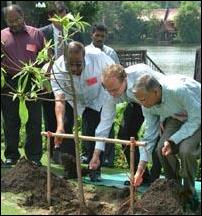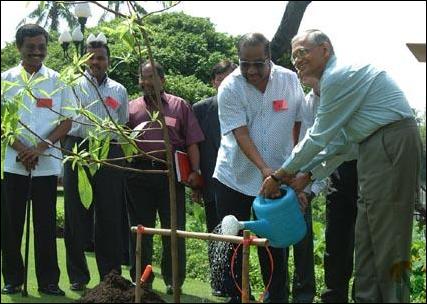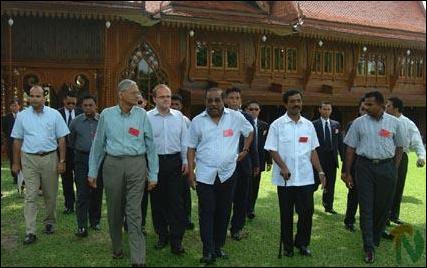Long term political matters on Talks agenda
[TamilNet, Sunday, 03 November 2002, 13:58 GMT]
Liberation Tigers of Tamil Eelam (LTTE) and the Government of Sri Lanka (GOSL), at the
conclusion of the second meeting of the first round of peace talks held in
Thailand, agreed to set up a joint task force (JTF) to identify immediate
humanitarian and rehabilitation needs of north east, work towards military
de-escalation and to look at political questions at the heart of two decades
of war. The JTF is first tasked to prepare for a political-level meeting of
key government s to take place in Norway on 25 November.
The JTF will be organized in the form of a sub-committee which will have 4 members of the LTTE led by Thamilselvan and 4 members from the GOSL lead by Bernard Goonetilleke. Two of the GOSL team members will be from the Muslim community.

The parties acknowledged that the peace talks must address a series of complex political questions in order to reach a negotiated solution to the ethnic conflict, including constitutional, legal, political and administrative issues. A sub-committee chaired by the heads of delegations to the peace talks, Mr. Anton Balasingham and Mr. G.L. Peiris and including other government representative Mr. Rauf Hakeem, leader of the Sri Lanka Muslim Congress will address these long term political matters.
The full text of the statement made by Norwegian Government follows:
Significant Steps to Restore Normalcy, Improve Security and Address Political MattersThe Government of Sri Lanka (GOSL) and the Liberation Tigers of Tamil Eelam (LTTE) conducted the second session of the Sri Lanka Peace Talks at the Rose Garden in Thailand from 31 October to 3 November 2002.
The parties demonstrated a positive, pragmatic and conciliatory approach in discussing a wide range of issues, including present challenges as well as matters relating to long-term solutions. The parties thereby continued the dual approach of moving step by step towards a lasting political settlement, while remaining fully focused on the ground situation. The parties reconfirmed their strong commitment to the Ceasefire Agreement and their support for the Sri Lanka Monitoring Mission.
Against the backdrop of recent tensions among the ethnic communities in the east, the parties agreed on immediate measures to improve the security situation, inter-ethnic co-operation and respect for human rights in the north and east. Acknowledging that peace belongs to all peoples of Sri Lanka, the parties are committed to accommodate the needs and aspirations of all three communities in the east ; Tamils, Muslims, and Sinhalese. The agreed measures are outlined in a separate statement issued by the Royal Norwegian Government on 1 November 2002.

In their determination to move the peace process forward, the parties reiterated that the process will be a long and demanding one. Throughout the process, the parties will continuously monitor the ground situation, thus enabling necessary action to be taken at all stages to ensure further progress.
In the quest for a final settlement, a broad range of issues must be addressed with considerable attention to detail. For this purpose, the parties agreed on establishing, whenever needed, sub-committees to act on specific matters under the auspices of the negotiation teams. The sub-committees will be continually active and report at the sessions of the talks, in order to accelerate progress and give in-depth attention to issues.
Following the agreement at the first session of talks to set up a joint task force, the parties agreed to establish this in the form of a Sub-Committee on Immediate Humanitarian and Rehabilitation Needs in the North and East. The role of the Sub-Committee will be to - Identify humanitarian and rehabilitation needs - Prioritize implementation of activities to meet these needs - Decide on the allocation of the financial resources for such activities - Determine implementing agencies for each of the activities.
The Sub-Committee will ensure the involvement of all ethnic communities so that their needs and aspirations are considered, and it will give priority to the mobilization of local labor and local institutions in the implementation of activities. The activities initiated by the Sub-Committee will be financed by a fund, which will be set up in accordance with arrangements to be agreed upon with donor governments.
The Sub-Committee will consist of four members selected by the LTTE and four by the GOSL. Two members of the respective negotiating teams, Mr. Tamilselvan of the LTTE and Mr. Bernard Goonetilleke of the GOSL, will be leading members of the Sub-Committee. Other GOSL representatives will include Mr. M.D.D. Peiris, Mr. M.I.M. Rafeek, and an additional member of the Muslim community. Other LTTE representatives will include Mr. Jay Maheswaran. The Sub-Committee will be assisted by a secretariat to be located in the Government Agent's Office in Killinochchi. Meetings of the Sub-Committee will be held in Killinochchi, Colombo, Batticaloa, and Kalmunai at the discretion of the committee.
As its first task the Sub-Committee will assist the Royal Norwegian Government in preparing for a political-level meeting of key governments to take place in Oslo, Norway on 25 November 2002. As the first ever of its kind, the meeting will demonstrate the unprecedented level of international support to Sri Lanka and to the parties in their present peace efforts. The meeting will aim at mobilizing financial support for immediate humanitarian and rehabilitation action in three priority areas agreed by the parties: - Resettling and rehabilitating Internally Displaced Persons - Rehabilitating war-affected women and children - Providing livelihoods for war-affected people in the North and East.
The international community will further be encouraged to increase investment in Sri Lanka and respond positively to new challenges in the south resulting from the peace process.
In line with the overall objective of facilitating the resettlement of internally displaced persons, the parties acted on the decision made at the first session of peace talks to address matters relating to high security zones and other areas made inaccessible to the public. To this end, a Sub-Committee on De-Escalation and Normalization was set up as a mechanism for a structured dialogue between the parties. While accommodating the security concerns of each party, the Sub-Committee will examine ways and means to ensure resettlement, the return of private property and the resumption of economic activities in these areas. This Sub-Committee will include high-level civilian and military personnel on both sides, including Mr. Austin Fernando of the Ministry of Defense and Mr. Karuna of the LTTE.
As another issue relating to the restoration of normalcy, the status of Tamil prisoners held under the Prevention of Terrorism Act was discussed.
The parties remain committed to building peace on the ground through practical steps to improve security and opportunity in people's daily lives. At the same time, the parties acknowledged that the peace talks must address a series of complex political questions in order to reach a negotiated solution to the ethnic conflict, including constitutional, legal, political and administrative issues. Following discussions, the parties agreed to establish a Sub-Committee to commence work in connection with relevant political matters. The parties agreed that access to expertise on political matters will be important in order for them to enter into negotiations on issues central to the peace process. The parties will jointly and separately address in depth, at the current stage of the peace process, relevant subjects such as other peace processes, political solutions to ethnic conflicts, models and systems of government, issues of post-conflict transition, co-ordination of international assistance, and reconciliation processes. To this end, the parties will interact with relevant experts and practitioners in these fields, as a basis for the formulation of approaches to the critical political issues for consideration in the future sessions of the peace talks.
The Sub-Committee on Political Matters will be chaired by the heads of delegations to the peace talks, Mr. Anton Balasingham and Mr. G.L. Peiris. Other government representatives will include Mr. Rauf Hakeem, leader of the Sri Lanka Muslim Congress.
The third session of talks will take place on 2 - 5 December 2002 in Oslo, Norway. The following sessions will be held on 6 - 9 January 2003, - 10 February 2003, and 18 - 21 March 2003.








 The parties acknowledged that the peace talks must address a series of complex political questions in order to reach a negotiated solution to the ethnic conflict, including constitutional, legal, political and administrative issues. A sub-committee chaired by the heads of delegations to the peace talks, Mr. Anton Balasingham and Mr. G.L. Peiris and including other government representative Mr. Rauf Hakeem, leader of the Sri Lanka Muslim Congress will address these long term political matters.
The parties acknowledged that the peace talks must address a series of complex political questions in order to reach a negotiated solution to the ethnic conflict, including constitutional, legal, political and administrative issues. A sub-committee chaired by the heads of delegations to the peace talks, Mr. Anton Balasingham and Mr. G.L. Peiris and including other government representative Mr. Rauf Hakeem, leader of the Sri Lanka Muslim Congress will address these long term political matters.
